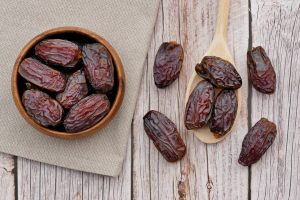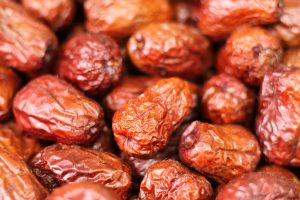
Dates are an incredibly versatile and nutritious food that have been a part of the human diet for thousands of years. Native to the Middle East, dates have been cultivated since ancient times and today are popular around the world. Dates are often associated with special occasions, but they can be enjoyed every day.
Nutritional Benefits of Dates
First, let’s take a look at the vitamins and minerals that dates contain. Dates are an excellent source of potassium, a mineral that’s essential for maintaining healthy blood pressure and heart rate. They also contain a moderate amount of magnesium, which helps to support strong bones and teeth. Dates also contain a significant amount of vitamin A, which helps to protect your vision and skin. Additionally, they are a good source of other essential vitamins and minerals such as calcium, iron, and B vitamins.
Next, let’s discuss the antioxidant content of dates. Antioxidants are compounds that help protect the body from damage caused by free radicals, which can cause chronic diseases like cancer and heart disease. Dates contain a variety of antioxidants, including phenolic compounds, carotenoids, flavonoids, and tannins. These antioxidants help to fight off free radicals and protect the body from oxidative stress.
In addition to their vitamins, minerals, and antioxidants, dates are also a good source of dietary fiber. Dietary fiber is important for maintaining digestive health, as it helps to promote regular bowel movements, stabilize blood sugar levels, and reduce the risk of developing certain diseases. Dates contain both soluble and insoluble fiber, making them an excellent source of dietary fiber.
History of Dates
Dates, a fruit that is as old as civilization, have been a part of human diets for thousands of years. Dates have been a staple of numerous cultures, from the deserts of the Middle East to the jungles of the Caribbean, and have played a major role in the development of many civilizations.
To fully understand the history of dates, one must first look to the Middle East, where the date palm tree was first domesticated over 6,000 years ago. Archaeological evidence suggests that dates were first cultivated in what is now the country of Iraq, and were likely picked wild by hunter-gatherer tribes.
The date palm tree quickly became a vital crop in the Ancient Middle East. Not only did it provide a reliable source of food, but its fibers could be used to make cloth, its leaves could be used for roofing and its wood could be used for furniture. Dates were a particularly important crop in Ancient Egypt, where the Pharaohs were believed to have consumed them as part of their daily diets.
From Ancient Egypt, dates spread throughout the Mediterranean basin and eventually to Europe. The Romans were particularly fond of dates, which were an important part of the Roman diet. In fact, the Roman historian Pliny the Elder wrote that dates were cultivated in the gardens of the emperor Nero.
The date palm tree also spread to the Americas during the early Colonial period. Dates were first introduced to the Americas in Florida, where they were likely introduced by Spanish explorers. From Florida, dates spread to the Caribbean, Central America, and eventually to the West Coast.
Today, dates are grown in dozens of countries around the world, especially in the Middle East, North Africa, and the United States. The most common type of date is the Medjool date, which is grown in Morocco, Algeria, and the United States. Other popular types of dates include Deglet Noor, Zahidi, and Halawi.
Although dates have been around for thousands of years, they are still enjoyed by people around the world. Whether you’re snacking on a handful of dates or using them to sweeten a recipe, dates are a delicious and nutritious treat that can be enjoyed year-round. So go ahead, and enjoy a date today!

Cooking with Dates
Dates are a versatile and widely available ingredient used in a variety of dishes. From salads and desserts to main courses, dates are a great addition to any culinary creation. Their natural sweetness and unique texture make them an ideal ingredient for healthy and delicious meals. Here, we’ll discuss the basics of cooking with dates.
Dates come in a variety of forms, from dried to fresh, and each form has its own unique flavor and texture. Dried dates are the most common form of dates and are typically used in baking and cooking recipes. They are chewy and sweet, and are great for adding extra sweetness to recipes. Fresh dates are juicy and have a unique, almost caramel-like flavor. They are best for cooking dishes that require a more subtle sweetness, like sauces or salads.
When buying dates, make sure to choose ones that are ripe and free of bruises or blemishes. If buying dried dates, make sure they are plump and moist, as dry dates may become too hard when cooked. Also, keep in mind that dates contain natural sugars, so make sure to adjust recipes accordingly if using in place of another sweetener.
When cooking with dates, it’s important to start with a recipe that is suitable for the type of dates you have. For example, dried dates are best for baking and sweet dishes, while fresh dates are better for savory dishes. Also, be sure to soak dried dates before adding them to recipes, as this will ensure they soften and become plump.
There are plenty of delicious recipes that are perfect for cooking with dates. Here are some of our favorites:
Date-Sweetened Caramel Sauce: This delicious caramel sauce is made with dates and can be used on everything from ice cream to pancakes. All you need to do is add pitted dates, cream, butter, and a pinch of salt to a food processor, and blend until smooth.
Date and Walnut Muffins: These tasty muffins are made with dates and walnuts for a nutty and sweet treat. You’ll need to soak the dates for at least 30 minutes before adding them to the batter. Once you’ve combined the ingredients and baked the muffins, they’re ready to enjoy.
Date and Almond Stuffed Pork Loin: This dish is perfect for a special occasion or for a hearty Sunday lunch. You’ll need to make a stuffing with dates, almonds, and herbs, and then stuff it into a pork loin before baking.
Date and Pistachio Granola: This sweet and crunchy granola is perfect for a healthy breakfast or snack. Combine oats, nuts, and coconut with date paste and a touch of honey, and bake until golden brown. Enjoy with yogurt or milk.
Date and Coconut Rice Pudding: Rice pudding is a classic dessert that is perfect for a cozy night in. Combine cooked rice, dates, and coconut milk, and simmer until thick and creamy. Top with a scoop of your favorite ice cream and enjoy.
We hope this has inspired you to get creative in the kitchen and start cooking with dates. From sauces to desserts, dates are a sweet and versatile ingredient that can be used in a variety of dishes. So get creative and see what delicious dishes you can come up with!
Clinical Trials on Dates
One study, published in the Journal of Nutrition, looked at the effects of date consumption on glucose levels in people with type 2 diabetes. The study found that consuming 3-4 dates daily for 12 weeks significantly reduced fasting blood glucose levels, as well as postprandial (after-meal) glucose levels, compared to the control group. This suggests that a regular dates consumption may have a beneficial effect on diabetes, which should be further studied.
Another study, published in the Journal of Traditional and Complementary Medicine, sought to evaluate the effects of dates consumption on blood lipids in people with hyperlipidemia (high cholesterol). The study found that consuming six dates daily for 8 weeks significantly reduced total cholesterol, low-density lipoprotein (LDL or “bad” cholesterol), and triglycerides, compared to the control group. This indicates that a regular consumption of dates can help to improve cholesterol levels and reduce the risk of cardiovascular disease.
A third study, published in the journal Nutrition & Metabolism, investigated the effects of dates consumption on blood pressure. The study found that consuming six dates daily for 6 weeks led to a significant reduction in both systolic and diastolic blood pressures. This suggests that regular consumption of dates may be able to help lower blood pressure and reduce the risk of hypertension and other cardiovascular diseases.
Finally, a fourth study, published in the journal Food Science & Nutrition, looked at the effects of eating dates on general health and well-being. The study found that consuming six dates daily for 8 weeks improved participants’ moods and overall sense of well-being, as well as reducing fatigue. Dates may have an impact on psychological health and may be beneficial for people struggling with stress and anxiety.